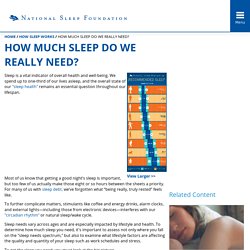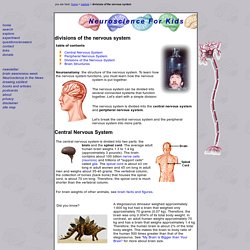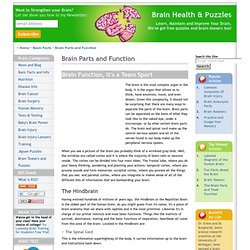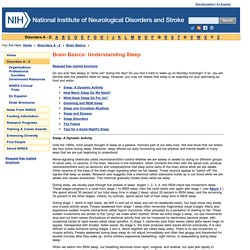

The Brain and Sleep" If you attach an electroencephalograph to a person's head, you can record the person's brainwave activity.

An awake and relaxed person generates alpha waves, which are consistent oscillations at about 10 cycles per second. An alert person generates beta waves, which are about twice as fast. During sleep, two slower patterns called theta waves and delta waves take over. Theta waves have oscillations in the range of 3.5 to 7 cycles per second, and delta waves have oscillations of less than 3.5 cycles per second. As a person falls asleep and sleep deepens, the brainwave patterns slow down. At several points during the night, something unexpected happens -- rapid eye movement (REM) sleep occurs.
REM sleep is when you dream. You must have both REM and NREM sleep to get a good night's sleep. Medicine can hamper your ability to get a good night's sleep. Missing out on a good night's sleep can seriously affect what happens when you're awake. How Much Sleep Do We Really Need? View Larger >> Sleep is a vital indicator of overall health and well-being.

We spend up to one-third of our lives asleep, and the overall state of our "sleep health" remains an essential question throughout our lifespan. Most of us know that getting a good night’s sleep is important, but too few of us actually make those eight or so hours between the sheets a priority. For many of us with sleep debt, we’ve forgotten what “being really, truly rested” feels like. To further complicate matters, stimulants like coffee and energy drinks, alarm clocks, and external lights—including those from electronic devices—interferes with our "circadian rhythm" or natural sleep/wake cycle. Sleep needs vary across ages and are especially impacted by lifestyle and health.
How Sleep Affects Your Weight. Can more sleep really help us control our weight?

Three top experts explore the possibilities. Why do I need to register or sign in for WebMD to save? We will provide you with a dropdown of all your saved articles when you are registered and signed in. Lose weight while you sleep. It sounds like something you'd hear on a late night infomercial -- just around the time you are reaching for that bag of cookies because, well, you can't sleep. But as wild as the idea sounds, substantial medical evidence suggests some fascinating links between sleep and weight. Questions/answers. The Hows, Whats and Whos of Neuroscience The Whats What is a neuron? A neuron is a nerve cell. Why sleep is important and what happens when you don't get enough. In clinical settings, cognitive-behavior therapy (CBT) has a 70-80 percent success rate for helping those who suffer from chronic insomnia.

Almost one third of people with insomnia achieve normal sleep and most reduce their symptoms by 50 percent and sleep an extra 45-60 minutes a night. When insomnia exists along with other psychological disorders like depression, say the experts, the initial treatment should address the underlying condition. But sometimes even after resolving the underlying condition, the insomnia still exists, says psychologist Jack Edinger, Ph.D., of the VA Medical Center in Durham, North Carolina and Professor of Psychiatry and Behavioral Sciences at Duke University and cautions that treating the depression usually doesn’t resolve the sleep difficulties. From his clinical experience, he has found that most patients with insomnia should be examined for specific behaviors and thoughts that may perpetuate the sleep problems. According to Dr. Functional divisions. What is the Brain Stem? Pons Function. THE BRAIN FROM TOP TO BOTTOM. What Is the Pons? Explore the nervous system. Divisions of the nervous system table of contents Neuroanatomy: the structure of the nervous system.

To learn how the nervous system functions, you must learn how the nervous system is put together. The nervous system can be divided into several connected systems that function together. Let's start with a simple division: Brain Parts Function & Parts of the Brain. The brain is the most complex organ in the body.

It is the organ that allows us to think, have emotions, move, and even dream. Given this complexity, it should not be surprising that there are many ways to separate the parts of the brain. Brain parts can be separated on the basis of what they look like to the naked eye, under a microscope, or by what certain brain parts do. Brain Basics: Understanding Sleep. Request free mailed brochure Do you ever feel sleepy or "zone out" during the day?

Do you find it hard to wake up on Monday mornings? If so, you are familiar with the powerful need for sleep. However, you may not realize that sleep is as essential for your well-being as food and water. Sleep: A Dynamic Activity Until the 1950s, most people thought of sleep as a passive, dormant part of our daily lives. Nerve-signaling chemicals called neurotransmitters control whether we are asleep or awake by acting on different groups of nerve cells, or neurons, in the brain.